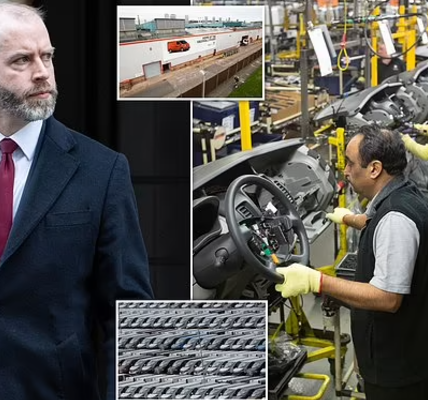Scots tell Starmer to ‘drill baby drill’ in the North Sea as more than 70% back using domestic oil and gas instead of imports to secure energy supplies_Nhy
More than seven in 10 Scots back drilling for oil and gas in the North Sea to reduce the country’s reliance on foreign imports, a survey has found.
In a blow for Sir Keir Starmer and Energy Secretary Ed Miliband, voters north of the border preferred meeting UK demand for fossil fuels from domestic sources rather than imports.
The UK has become increasingly reliant on overseas oil and gas imports with around two-fifths of the nation’s energy needs being met by imports, down from the early 2010s but up from the 1990s.
The US, Norway, Qatar and Peru are among the largest sellers of fossil fuels to the UK.
The poll, carried out by Survation on behalf of consultancy firm True North, found that there was support for drilling from more than 70 per cent of voters, including almost three-quarters of those who backed Labour in last year’s general election.
SNP and Tory voters also support it in large numbers.
The poll also found that just 24 per cent of Scots believe the windfall tax on energy companies has helped reduce household bills.
Just over a quarter (26 per cent) think the policy is effective at encouraging firms to move to renewables.

In a blow for Sir Keir Starmer and Energy Secretary Ed Miliband, voters north of the border preferred meeting UK demand for fossil fuels from domestic sources rather than imports.

The poll, carried out by Survation on behalf of consultancy firm True North, found that there was support for drilling from more than 70 per cent of voters, including almost three-quarters of those who backed Labour in last year’s general election.
It was first introduced under the Conservative Westminster government and extended under Labour.
The Energy Profits Levy applied an extra tax on windfall profits, which came at a time when energy bills for consumers were surging while energy firms were recording record profits.
The UK Government has also pledged to deliver 95 per cent of power by clean energy by 2030.
According to Survation, only 35 per cent of respondents feel the target is achievable.
However, a majority (53 per cent) said they back the clean power goal while 60 per cent said they support the building of new transmission infrastructure, such as pylons, to support it.
True North senior energy adviser Allister Thomas said: ‘A shift away from oil and gas is inevitable – and crucial – but failing to carry out a managed transition risks seeing the UK importing more at a higher carbon footprint, while losing jobs and harming investment.
‘As this polling suggests, it makes more sense to ramp up renewables while also pursuing policies to harness the UK’s oil and gas resources as they continue to play a crucial role in our energy mix, protecting jobs and mitigating imports in the meantime.
‘Labour will be pleased to see strong backing for its clean power 2030 ambition and build-out of infrastructure such as new pylons.
‘However, there’s considerable scepticism around whether that herculean task can be achieved within a short time-frame. Recent blackout concerns due to our reliance on weather-based generation show just how far there is to go.’
Russell Borthwick, chief executive of the Aberdeen and Grampian Chamber of Commerce, said: ‘A common sense approach to energy policy has been sorely lacking when it comes to our oil and gas resources and the vital energy supply chains which sustain them.
‘To deliver a managed transition we should ensure these national assets are protected, starting with the removal of the punitive windfall tax which continues to have a chilling effect on investment.
‘Clean power 2030 holds promise for north-east Scotland, at the heart of one of the world’s largest offshore wind markets, but we must be realistic about the major challenges we face.
‘Huge ramp up of grid connection and transmission networks, cutting of planning and consent red tape, and delivery of a strong pipeline of projects are among the hurdles we must overcome to realise success.’
The UK Government has been approached for comment.
But Tessa Khan, executive director at Uplift, which campaigns against fossil fuels, said: ‘Of course people want the UK to be more energy independent but we won’t get there by drilling for more oil and gas.
‘When it comes to gas, the reality is that the UK has burnt most of its reserves and the oil that remains is mainly exported and sold on the international market, doing nothing to lower energy bills or increase energy security here in the UK.
‘The overwhelming majority of the Scottish public see renewables and energy efficiency measures as the way to achieve an affordable and secure energy supply in the long-term.
‘Polling also shows that three quarters of Scottish business leaders think that transitioning away from oil and gas is in the public interest and support a ban on new licensing.’




